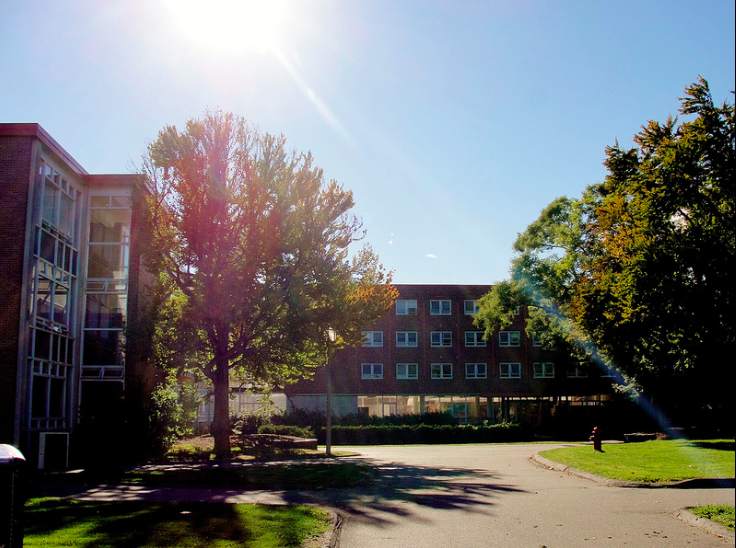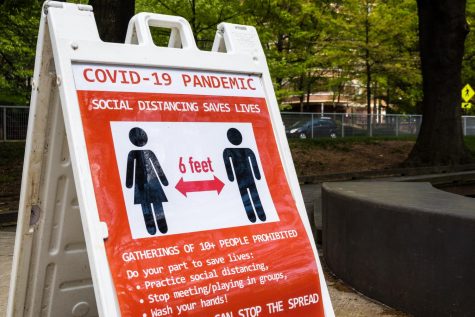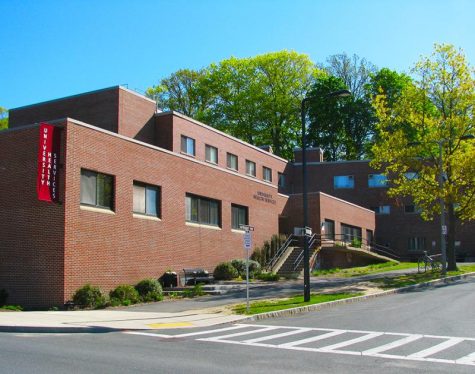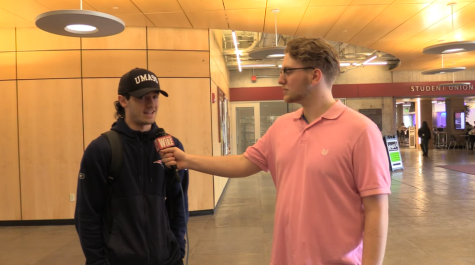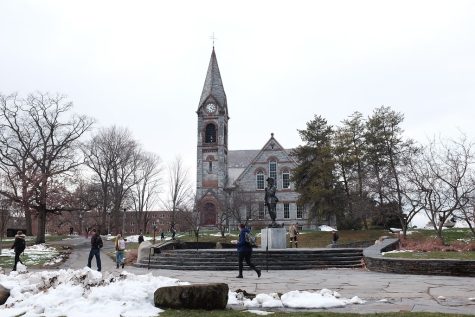Salvaging a semester: SGA, a COVID calamity and where we go from here
A frustrated student body and fatigued Amherst community turns to the Student Government Association as trust in administrators runs its course
At the onset of what would become the present pandemic, Toni Mulligan opposed closing campus. They feared what a mass exodus half-way through a bone-chilling Amherst winter might mean for students facing housing insecurity– displacement, hunger and homelessness.
What they knew from personal experience, they wanted to spare their residents on Baker Hall’s Spectrum Floor from ever having to endure.
Unlike the vast majority of their peers, when it became clear that UMass’ two-week extension of spring break wouldn’t suffice in circumventing the novel coronavirus, Mulligan returned to campus. Now in Gorman Hall, they staffed a residential floor reserved for international and at-risk students who had remained on campus over the hiatus.
“I really wasn’t concerned about students’ behavior on-campus. The residents I was supporting at the beginning of the crisis all took the protocols pretty seriously, and when people did travel it seemed to be mostly for essentials,” they say.
Mulligan moved into Gorman at the end of March and stayed until the end of the semester. They graduated along with the rest of the Class of 2020, receiving their diploma in the mail, tucked inside a yellow manilla folder lined with bubble wrap.
This is their second semester off-campus, but only their first taking preventative measures to physically distance themselves from their alma mater and its current pupils. UMass has brought back 5,300 students for an on-campus spring semester, and Mulligan figures any Minuteman flouting the university’s self-sequester guidelines in public could account for one of the campus’s 342 total active cases.
Afraid of just that– that an encounter like one they had in the Target at Hadley’s Hampshire Mall with a group of five to six college-aged men, strongly built and donning UMass Football apparel, could have exposed them to students violating UMass’ high operational posture guidelines– Mulligan took to a familiar forum to vent their frustration.
“There were like six dudes from the football team at Target yesterday along with some other women straight up wearing UMass insignia covid (sic) masks,” they wrote under a post on Overheard at UMass, a hyper-local Facebook page with over 20,000 members, among them students, alumni and professors.
“The concerns are real,” they said.
The men had been talking about hanging out together later that evening, Mulligan recalls. They were all over six-feet but looked as though they might be underclassmen. Mulligan worked as a summer RA for the football team in 2019 and says they didn’t recognize any of the six shoppers, but instead identified the men by their clothing.
“My initial reaction was ‘Hey, that tall guy in the UMass Athletics shirt doesn’t have his mask covering his nose. He’s lucky I’m not his RA.’ I like to try and assume that people are out for essentials, but the attitude of students that continue to not take the pandemic seriously are going to endanger the entire community.”
Community members like Mulligan and their partner, who’ve agreed to frequent Northampton stores during the remainder of UMass’ tentative two-week high-risk posture, have come to realize that even a minor mishandling on a college campus has the potential to do more than just cramp the surrounding community’s style.
Amherst childcare counselors have had their programs temporarily shut down, programs staffed primarily by UMass students who now find themselves under stringent self-sequester guidelines. Students working off-campus still face sanctions on their employment with no reprieve but a $300 microgrant that hardly approximates the price of rent in Amherst, where the monthly rent on an average one-bedroom apartment unit goes for at least double the price.
Amid widespread consternation and a public sprint to pin culpability on anyone with a guilty countenance, the Student Government Association has stepped in to mediate the rapidly souring relationship between the student body it represents and UMass administrators. Wrestling to both make sense of an unraveled COVID containment plan and to reconcile the interests of a scorned and divided student body, the SGA must undertake a capacious new role as interlocutor and hope that little gets lost in translation.
And all signs indicate that arbitration’s already begun. At the helm of SGA operations, Student Body President Sonya Epstein says making even incremental headway relies on strategic advocacy from voices like theirs, the most prominent in student legislature but by no means the loudest.
Discontented students and disgruntled parents have made noise across every social media platform, airing their grievances on Instagram, prompted by community accounts like Black Sheep UMass and UMass Gigs; on the UMass subReddit, where most video documentation of on and off-campus parties make their debut; and, of course, on Facebook, where early last week an SGA email campaign began circulating in several groups.
Days before, on the Sunday UMass announced the change in posture from elevated to high-risk, SGA and Graduate Student Senate President Justin Birch met with administrators to review the change in guidelines. Epstein says that having asked about student employment and not receiving a clear response from either Chancellor Kumble Subbaswamy and Vice-Chancellor of Student Affairs and Campus Life Brandi Hephner LaBanc, they “realized that students were going to be put more and more at risk.”
On Tuesday morning, Epstein and Birch received an email draft from the administration which would go out to the student body later that night. The updated guidance from Vice-Chancellor LaBanc specifies that student employees should work remotely, announces the Student Employment Assistance Grant and includes a directive for off-campus students to heed self-sequestration guidelines along with on-campus residents. The email also notes the university had undertaken to reach out to employers through the Amherst Business Improvement District and the Amherst Area Chamber of Commerce asking for their cooperation.
The following week, UMass Public Relations Representative Ed Blaguszewski would issue a statement informing students that the university had not authorized its staff members to contact local businesses to request that UMass students be prevented from working. At that point, de facto sanctions on student employment were already fully-fledged and widely understood.
Epstein says they issued recommendations to UMass administrators before the email’s release. “We asked them to pay students with on-campus jobs because that’s already budgeted for, the money is there. There is no reason for the university to profit off of the posture change and forcing students not to be able to work,” they say.
“The email went out without any policy changes.”
Despite the need for more conscientious adherence to COVID guidelines delineated by the school, Epstein says university policy has failed on many fronts to safeguard and protect students.
“There’s been policy points and guidance points that are clearly harming students,” they say. “I think UMass has definitely not handled supporting RA’s and Residential Life Security well, they’re clearly overworked, understaffed, underpaid, as well, I’m sure. Those students are being forced into really risky situations with limited support.”
“[The] biggest failure, though, has been around off-campus work and not allowing students to attend their jobs without being sanctioned. A lot of students are afraid of being sanctioned, others have had their shifts canceled by their employer, and UMass has not given enough compensation to those students.”
And so, SGA issued a press release addressing the financial casualties suffered during self-sequestration. Epstein says SGA “is constantly asking itself ‘ How can we be more disruptive?’ When we get pushback, we have to escalate our advocacy in some way. If [administrators] are annoyed, hopefully, that’ll push them to make the change that we need.”
Then, the Student Employment Email Campaign emerged calling on university administrators to reverse its “insensitive” employment decision, saying “the resources offered by the University in recent communications are insufficient and take valuable time to receive.”
On Feb. 11, SGA secured compensation of lost wages for on-campus student workers.
In retrospect, Epstein laments that the press release and email campaign were at all necessary– “UMass cares about its reputation. I wish I could transfer some of that care to its students.”
But Mulligan says the mistakes that catalyzed UMass’ COVID outbreak do not rest entirely on administrators’ shoulders. “The problem is two-fold,” they say. “UMass admin had no reason beyond financial greed to invite students here that do not have housing or in-person scholastic needs. Equally to blame, is that a lot of students from out East treat Amherst as a personal dumping ground.”
“Some students come out to UMass under the assumption that UMass is a ‘safety school’ or a ‘party school’ and they are entitled to disturbing the peace of their local neighbors, leaving garbage around town, or vandalizing the school and its community.”
“The Greek life organizations involved with the parties should be disbanded. They too, continue to cause the community more harm than they are worth,” Mulligan says.
UMass treats fraternities as Registered Student Organizations, each falling under one of four representative Greek councils: the Panhellenic Council, the National Panhellenic Council, the Multicultural Greek Council and the Inter-Fraternity Council.
SGA bylaws confer the Secretary of the Registry, Andrew Abramson, the authority to discipline RSOs. Violation of any state or federal law, SGA policy or university policy, including COVID-19 guidelines, all warrant dissolution, but only an official investigation can determine whether the group facing disciplinary measures has committed a policy violation.
Abramson says “[he thinks] the guidelines around RSOs not having large gatherings have been very clear, but at the end of the day, it comes down to whether RSOs choose to follow those guidelines.”
He will step in to cast the deciding vote on Theta Chi’s dissolution once the Dean of Students Office concludes their investigation into the frat’s infringement of high-posture guidelines, two congested “good-to-be-back” parties first documented by the Daily Collegian.
“While DOSO is investigating, we need to support students who are impacted by the University’s elevated COVID posture. No one should be missing meals because of COVID spread and subsequent loss of income,” he says.
“And to be clear, fighting for students’ economic security does not preclude us from holding each other accountable for breaking COVID guidelines.”
SGA Secretary of University Policy Sara McKenna says fund allocation remains the primary incentive for individual fraternities, which can choose to register as RSOs or fall into inactivity, to maintain their standing. Of the four Greek councils, Theta Chi belongs to the Inter-Fraternity Council, the council that has historically requested the least funding from the SGA.
Theta Chi is currently under interim suspension, but even if the DOSO finds the fraternity culpable, it will be able to reapply as a new RSO in future semesters. The conduct proceeding is a private process and the SGA does not receive case updates or copies of evidence presented, but McKenna says the stakes are low.
“I reached out to them, right as the semester was starting to introduce myself and make clear what the event guidelines are for this semester,” says McKenna, whose role in Epstein’s cabinet involves liaising with RSOs. “The standard guidance was that there were no in-person events to take place.”
McKenna says she thinks the guidance laid out was clear, but, one week later, after Theta Chi had been placed on interim suspension, she received an email from IFC president Timothy Benton inquiring about repercussions an RSO could face if found guilty of breaking conduct rules established under SGA bylaws.
“He wanted to know what the SGA’s role in overseeing the fraternities is. What he essentially said was ‘I was wondering if you could explain to me what’s happening between SGA and different fraternities. I am not really sure how SGA is getting involved, and I would appreciate to hear what’s going on’,” she says.
“So, I made sure that the standard guidance was made clear to him and what the risks of non-compliance are,” she says. “If anything, even though Greek life is kind of separate from SGA, the university does more of the day-to-day operations, the fall-out from frats and other students refusing to adhere to the guidance affects SGA just as much as it affects them.”
The urgency of addressing the sudden surge in COVID cases placed other SGA priorities on the back-burner. Two motions to restructure the Student Business Investment Board, one to designate the board Ad Hoc and another to broaden the relationship between the board the Secretary of University Policy, passed last week when the Senate reconvened for the first time this semester. The motions were originally drafted in the fall of 2019.
“After a year of waiting, that project got finished,” McKenna says. “Other projects include a Survivors Bill of Rights that we’re working on presenting to the university to be able to reaffirm that these are the rights UMass will provide to survivors of sexual violence. We want to finalize that this year, but, now, we don’t really know if that’s a possibility.”
At the end of the day, she says, students’ lives take precedence over everything else and mitigating the shortcomings of a COVID strategy that, in many ways, was doomed to fail is a priority.
“I think that at a higher administrative level, there just wasn’t the ability for this to succeed. I mean, students didn’t have any residence hall security for the first week that they were on campus,” she says. “We said ‘please, you can’t bring this many students back, especially students who have fully virtual classes, they don’t have anything to lose if classes go fully remote. They don’t have anything to do besides sit in their dorm and be on their computer.’ And it was just too many students.”
As SGA continues to mediate the COVID crisis, maneuvering to play defense and offense, President Epstein concludes that “the worst thing that admin could do is send students home again. Right now, the administration isn’t considering that, but it would be the worst outcome that could possibly come of all this.”
Community members like Mulligan see the issue differently– UMass failing to punish COVID guideline infractions with immediacy threatens the surrounding community more than another semester studying remotely threatens on-campus students.
“A couple of summers ago I worked for UMass’s own Upward Bound program with some local high schoolers from Springfield. Not a single one of them got accepted into UMass Amherst. You know how heartbreaking it is to see local kids bust their asses to be the first in their family to go to a state university, and they can’t even go to one their families can easily visit?”
“It’s a little vindictive, but I want to see students expelled for partying during COVID,” they say. “It’s a joke. UMass Amherst is a part of our Western Mass community. It’s about time they acted like it.”
Email Rebeca at [email protected] or follow her on Twitter @RebecaPerieraa

